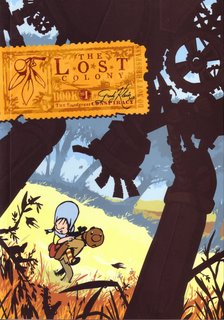The Lost Colony
 How can a book that takes place in a world of fantasy be an insightful look into American history? Grady Klein's The Lost Colony, a launch title from First Second Books, manages just that with an eye-opening look at the national shame of slavery. It's an odd thing to find in a Young Adults book with a loose, cartoony style and candy colors you could eat, but it's there.
How can a book that takes place in a world of fantasy be an insightful look into American history? Grady Klein's The Lost Colony, a launch title from First Second Books, manages just that with an eye-opening look at the national shame of slavery. It's an odd thing to find in a Young Adults book with a loose, cartoony style and candy colors you could eat, but it's there.
The opening sequence (which is partially shown in animated form here) is shocking, as it presents a cute little girl who simply wants some help with her chores as she ransacks her savings to see if she has enough money to buy something she's seen some advertising flyers for. A cute kid saving money to buy their heart's dream tugs at the heartstrings, doesn't it? What about when the object of her desire is a slave? It's incredibly well presented, with an extended drawing out of her actions before her expected purchase is revealed in the first panel after a page-turn. After an initial empathy with the girl, the reader is sent into a state of shock, forced to re-evaluate not only the contents of the first few pages, but also his own opinions about slavery. There is no argument being made here that slavery isn't evil, but there is an argument being made here that it's not so easy to dismiss slaveholders as "them", as "other", as "alien". It's easy when studying history to think that people from the past were fundamentally different, or to demonize those who held beliefs that we later see to be evil. It's easy to think that every slaveholder was a monster, but that's a black-and-white viewpoint, and those are seldom true. The fact is, they were people much like us who accepted a great evil because it seemed expedient. They can be no more demonized that we should be in a generation or two, when our casual use of fossil fuel comes to be seen as a crime against humanity. The old dictum that "those who do not learn history are doomed to repeat it" only holds true when we realize that we could make the same mistakes. It's shocking and compelling, and it's all the more surprising coming from the pages of this book. The goofy characters and colorful art make The Lost Colony one of those subversive reads that disguises its intellectual payload in charm and simplicity. It is addressing a lot of issues central to the history of America: slavery, racism, the "melting pot", money, technology, trade, isolationism, and more. It never feels preachy, and with some interesting storytelling techniques in play, it never feels like it's talking down to the reader.
It's shocking and compelling, and it's all the more surprising coming from the pages of this book. The goofy characters and colorful art make The Lost Colony one of those subversive reads that disguises its intellectual payload in charm and simplicity. It is addressing a lot of issues central to the history of America: slavery, racism, the "melting pot", money, technology, trade, isolationism, and more. It never feels preachy, and with some interesting storytelling techniques in play, it never feels like it's talking down to the reader.
The Lost Colony is one of the first books released from First Second, and I'd like to take a moment to discuss the production values they are bringing to the table here. Why? Because I'm an utter and complete whore when it comes to well-produced books. Eschewing the currently popular tankobon digest format, First Second keeps it's eye squarely focused on mainstream bookstore penetration with the format of their books. This is the size of a industry standard trade paperback, the kind one would find with Oprah's Book Club or any other high-profile literary paperback. The coverstock is heavy and beautifully textured, and the pages are thick and a white that make the colors really pop. Combining the merits of the literary trade and the coffee table art book, this could be the format that takes comics that next elusive step into popular consciousness.
The Lost Colony releases this week at booksellers everywhere, including Amazon.com.

No comments:
Post a Comment